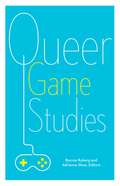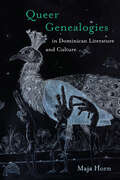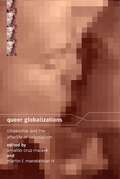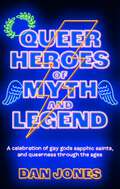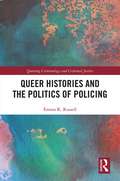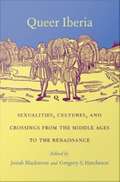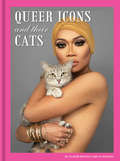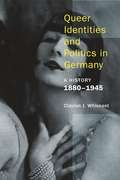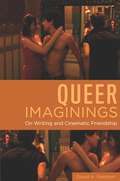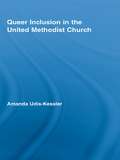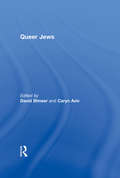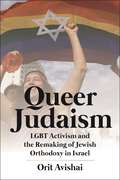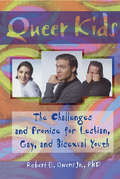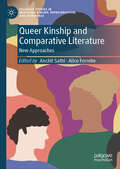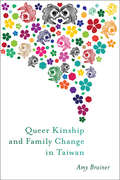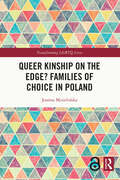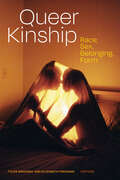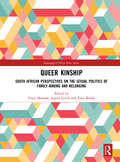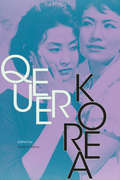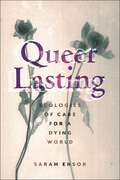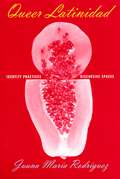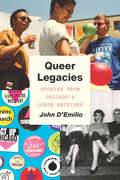- Table View
- List View
Queer Game Studies
by Adrienne Shaw Bonnie RubergVideo games have developed into a rich, growing field at many top universities, but they have rarely been considered from a queer perspective. Immersion in new worlds, video games seem to offer the perfect opportunity to explore the alterity that queer culture longs for, but often sexism and discrimination in gamer culture steal the spotlight. Queer Game Studies provides a welcome corrective, revealing the capacious albeit underappreciated communities that are making, playing, and studying queer games.These in-depth, diverse, and accessible essays use queerness to challenge the ideas that have dominated gaming discussions. Demonstrating the centrality of LGBTQ issues to the gamer world, they establish an alternative lens for examining this increasingly important culture. Queer Game Studies covers important subjects such as the representation of queer bodies, the casual misogyny prevalent in video games, the need for greater diversity in gamer culture, and reading popular games like Bayonetta, Mass Effect, and Metal Gear Solid from a queer perspective. Perfect for both everyday readers and instructors looking to add diversity to their courses, Queer Game Studies is the ideal introduction to the vast and vibrant realm of queer gaming. Contributors: Leigh Alexander; Gregory L. Bagnall, U of Rhode Island; Hanna Brady; Mattie Brice; Derek Burrill, U of California, Riverside; Edmond Y. Chang, U of Oregon; Naomi M. Clark; Katherine Cross, CUNY; Kim d&’Amazing, Royal Melbourne Institute of Technology; Aubrey Gabel, U of California, Berkeley; Christopher Goetz, U of Iowa; Jack Halberstam, U of Southern California; Todd Harper, U of Baltimore; Larissa Hjorth, Royal Melbourne Institute of Technology; Chelsea Howe; Jesper Juul, Royal Danish Academy of Fine Arts; merritt kopas; Colleen Macklin, Parsons School of Design; Amanda Phillips, Georgetown U; Gabriela T. Richard, Pennsylvania State U; Toni Rocca; Sarah Schoemann, Georgia Institute of Technology; Kathryn Bond Stockton, U of Utah; Zoya Street, U of Lancaster; Peter Wonica; Robert Yang, Parsons School of Design; Jordan Youngblood, Eastern Connecticut State U.
Queer Genealogies in Dominican Literature and Culture
by Maja HornTracing cultural representations of queerness in the Dominican Republic from the 1950s to the present In this book, Maja Horn examines the evolution of queer Dominican literary and cultural production from the 1950s to the present, challenging simplistic developmental narratives of LGBTIQ+ progress. Through an analysis of literature, theater, and activism, Horn traces how same-sex desire and gender nonconformity have been negotiated both tacitly and overtly across the years.Beginning with early forerunners, Horn looks at literary representations in works by Hilma Contreras and Pedro René Contín Aybar during the 1930–1961 dictatorship of Rafael Trujillo. Horn goes on to explore the emergence of queer nightlife spaces during the Balaguer years through novels by Rita Indiana Hernández and Rey Emmanuel Andújar. Horn discusses how the work of playwright Waddys Jáquez challenges reductive mainstream representations of trans subjects and HIV/AIDS in the new democratic era. The book concludes with a discussion of groundbreaking recent texts that have expanded portrayals beyond Santo Domingo and introduced new perspectives.Throughout Queer Genealogies in Dominican Literature and Culture, Horn shows how class, race, and gender have shaped access to public space and strategies for negotiating sexuality. Horn also reveals the coexistence of different ways of expressing queer identities. Recognizing the influence of coloniality and narratives of identity in the global North, Horn celebrates the shifting geographies and multiplicities of a uniquely creole Dominican queerness.
Queer Globalizations: Citizenship and the Afterlife of Colonialism (Sexual Cultures #9)
by Arnaldo Cruz-Malavé MARTIN F. MANALANSAN IVScholars of postcolonial and LGBT studies examine the validity of the globalization of queer culturesGlobalization has a taste for queer cultures. Whether in advertising, film, performance art, the internet, or in the political discourses of human rights in emerging democracies, queerness sells and the transnational circulation of peoples, identities and social movements that we call "globalization" can be liberating to the extent that it incorporates queer lives and cultures. From this perspective, globalization is seen as allowing the emergence of queer identities and cultures on a global scale. The essays in Queer Globalizations bring together scholars of postcolonial and lesbian and gay studies in order to examine from multiple perspectives the narratives that have sought to define globalization. In examining the tales that have been spun about globalization, these scholars have tried not only to assess the validity of the claims made for globalization, they have also attempted to identify the tactics and rhetorical strategies through which these claims and through which global circulation are constructed and operate. Contributors include Joseba Gabilondo, Gayatri Gopinath, Janet Ann Jakobsen, Miranda Joseph, Katie King, William Leap, Lawrence LaFountain-Stokes, Bill Maurer, Cindy Patton, Chela Sandoval, Ann Pellegrini, Silviano Santiago, and Roberto Strongman.
Queer Heroes of Myth and Legend: A celebration of gay gods, sapphic saints, and queerness through the ages
by Dan JonesHidden in the margins of history books, classical literature, and thousands of years of stories, myths and legends, through to contemporary literature, TV and film, there is a diverse and other-worldly super community of queer heroes to discover, learn from, and celebrate. Be captivated by stories of forbidden love like Patroclus & Achilles (explored in Madeleine Miller's bestseller Song of Achilles), join the cult of Antinous (inspiration for Oscar Wilde), get down with pansexual god Set in Egyptian myth, and fall for Zimbabwe's trans God Mawi. And from modern pop-culture, through Dan Jones's witty, upbeat style, learn more about 90s fan obsessions Xena: Warrior Princess and Buffy the Vampire Slayer, Neil Gaiman's American Gods and the BBC's Doctor Who. Queer Heroes of Myth & Legend brings to life characters who are romantic, brave, mysterious, and always fantastical. It is a magnificent celebration of queerness through the ages in all its legendary glory.
Queer Heroes of Myth and Legend: A celebration of gay gods, sapphic saints, and queerness through the ages
by Dan JonesHidden in the margins of history books, classical literature, and thousands of years of stories, myths and legends, through to contemporary literature, TV and film, there is a diverse and other-worldly super community of queer heroes to discover, learn from, and celebrate. Be captivated by stories of forbidden love like Patroclus & Achilles (explored in Madeleine Miller's bestseller Song of Achilles), join the cult of Antinous (inspiration for Oscar Wilde), get down with pansexual god Set in Egyptian myth, and fall for Zimbabwe's trans God Mawi. And from modern pop-culture, through Dan Jones's witty, upbeat style, learn more about 90s fan obsessions Xena: Warrior Princess and Buffy the Vampire Slayer, Neil Gaiman's American Gods and the BBC's Doctor Who. Queer Heroes of Myth & Legend brings to life characters who are romantic, brave, mysterious, and always fantastical. It is a magnificent celebration of queerness through the ages in all its legendary glory.
Queer Histories and the Politics of Policing (Queering Criminology and Criminal Justice)
by Emma K. RussellDespite ongoing challenges to the criminalisation and surveillance of queer lives, police leaders are now promoted as allies and defenders of LGBT rights. However, in this book, Emma K. Russell argues that the surface inclusion of select LGBT identities in the protective aspirations of the law is deeply tenuous and conditional, and that police recognition is both premised upon and reproductive of an imaginary of' 'good queer citizens'—those who are respectable, responsible, and 'just like' their heterosexual counterparts. Based on original empirical research, Russell presents a detailed analysis of the political complexities, compromises, and investments that underpin LGBT efforts to achieve sexual rights and protections. With a historical trajectory that spans the so-called 'decriminalisation' era to the present day, she shows how LGBT activists have both resisted and embraced police incursions into queer space, and how—with LGBT support—police leaders have re-crafted histories of violence as stories of institutional progress. Queer Histories and the Politics of Policing advances broader understandings of the nature of police power and the shifting terrain of sexual citizenship. It will be of interest to students and researchers of criminology, sociology, and law engaged in studies of policing, social justice, and gender and sexuality.
Queer Iberia: Sexualities, Cultures, and Crossings from the Middle Ages to the Renaissance
by Josiah Blackmore Gregory S. HutchesonMartyred saints, Moors, Jews, viragoes, hermaphrodites, sodomites, kings, queens, and cross-dressers comprise the fascinating mosaic of historical and imaginative figures unearthed in Queer Iberia. The essays in this volume describe and analyze the sexual diversity that proliferated during the period between the tenth and the sixteenth centuries when political hegemony in the region passed from Muslim to Christian hands. To show how sexual otherness is most evident at points of cultural conflict, the contributors use a variety of methodologies and perspectives and consider source materials that originated in Castilian, Latin, Arabic, Catalan, and Galician-Portuguese. Covering topics from the martydom of Pelagius to the exploits of the transgendered Catalina de Erauso, this volume is the first to provide a comprehensive historical examination of the relations among race, gender, sexuality, nation-building, colonialism, and imperial expansion in medieval and early modern Iberia. Some essays consider archival evidence of sexual otherness or evaluate the use of "deviance" as a marker for cultural and racial difference, while others explore both male and female homoeroticism as literary-aesthetic discourse or attempt to open up canonical texts to alternative readings. Positing a queerness intrinsic to Iberia's historical process and cultural identity, Queer Iberia will challenge the field of Iberian studies while appealing to scholars of medieval, cultural, Hispanic, gender, and gay and lesbian studies. Contributors. Josiah Blackmore, Linde M. Brocato, Catherine Brown, Israel Burshatin, Daniel Eisenberg, E. Michael Gerli, Roberto J. Gonzlez-Casanovas, Gregory S. Hutcheson, Mark D. Jordan, Sara Lipton, Benjamin Liu, Mary Elizabeth Perry, Michael Solomon, Louise O. Vasvri, Barbara Weissberger
Queer Icons and Their Cats
by Alison Nastasi PJ NastasiThese cat lovers are out and purr-oud!Freddie Mercury, Sylvia Rivera, Alison Bechdel, Dusty Springfield. This book is a celebration of queer icons of the past and present and their furry feline friends. From images of lost legends such as Josephine Baker and James Baldwin, to snapshots of contemporary trailblazers like comedian Tig Notaro and fashion designer Jason Wu—these charming and eccentric photographs capture what it truly means to be a cat purr-son.• PURR-FECT FOR CAT LOVERS: This book celebrates the love between human and cat. What better gift could you get the feline fancier in your life?• AMEWSING ANECDOTES AND IMPAWTENT MOMENTS: Learn about the lives of the queer heroes who came before us and those who are still fighting for equality and inclusion. We're not kitten around—with watershed moments like the Stonewall riots and sweet stories of domestic bliss, this book will both entertain and inspire you.• PHOTOS WITH CATITUDE: In these purr-ecious photographs, you'll get to see your heroes in unguarded moments expressing love for their pets. This collection of images will bring joy to any cat lover's heart.Perfect for: • LGBTQIA+ cat lovers and the people who shop for them• Anyone interested in learning more about influential queer figures—and their pets!
Queer Identities and Politics in Germany: A History, 1880–1945
by Clayton WhisnantGermany in the late nineteenth and early twentieth centuries witnessed key developments in LGBT history, including the growth of the world's first homosexual organizations and gay and lesbian magazines, as well as an influential community of German sexologists and psychoanalysts. Queer Identities and Politics in Germany describes these events in detail, from vibrant gay social scenes to the Nazi persecution that sent many LGBT people to concentration camps.Clayton J. Whisnant recounts the emergence of various queer identities in Germany from 1880 to 1945 and the political strategies pursued by early homosexual activists. Drawing on recent English and German-language scholarship, he enriches the debate over whether science contributed to social progress or persecution during this period, and he offers new information on the Nazis' preoccupation with homosexuality. The book's epilogue locates remnants of the pre-1945 era in Germany today.
Queer Imaginings: On Writing and Cinematic Friendship (Queer Screens)
by David A. GerstnerHow do we identify the "queer auteur" and their queer imaginings? Is it possible to account for such a figure when the very terms "queer" and "auteur" invoke aesthetic surprises and disorientations, disconcerting ironies and paradoxes, and biographical deceits and ambiguities? In eighteen eloquent chapters, David A. Gerstner traces a history of ideas that spotlight an ever-shifting terrain associated with auteur theory and, in particular, queer-auteur theory. Engaging with the likes of Oscar Wilde, Walter Benjamin, James Baldwin, Jean Louis Baudry, Linda Nochlin, Jane Gallop, Cáel Keegan, Luce Irigaray, and other prominent critical thinkers, Gerstner contemplates how the queer auteur in film theory might open us to the work of desire. Queer Imaginings argues for a queer-auteur in which critical theory is reenabled to reconceptualize the auteur in relation to race, gender, sexuality, and desire. Gerstner succinctly defines the contours of a history and the ongoing discussions that situate queer and auteur theories in film studies. Ultimately, Queer Imaginings is a journey in shared pleasures in which writing for and about cinema makes way for unanticipated cinematic friendships.
Queer Inclusion in the United Methodist Church (New Approaches in Sociology)
by Amanda Udis-KesslerThe United Methodist Church has been in conflict over lesbian/gay/bisexual/transgender inclusion issues since 1972. That year, in response to the gay liberation and gay rights movements, wording was added to the UMC Book of Discipline (the compilation of denominational policies and doctrines) characterizing homosexuality as "incompatible with Christian teaching." Since then, United Methodist ministers have been forbidden to perform same-sex commitment ceremonies (and United Methodist churches forbidden to host them), a rule has been passed that non-heterosexual United Methodist ministers must be celibate, and the UMC has forbidden the funding of any program or organization "supporting" homosexuality. These policies have been met with significant resistance by those fighting for GLBT inclusion. In this groundbreaking book, Udis-Kessler examines this struggle, analyzing both sides of this divisive debate among one of the most prominent religious organizations in the United States.
Queer Inclusions, Continental Divisions: Public Recognition of Sexual Diversity in Canada and the United States
by David RaysideNo area of public policy and law has seen more change than lesbian, gay, bi-sexual, and trans-gender rights, and none so greatly needs careful comparative analysis. Queer Inclusions, Continental Divisions explores the politics of sexual diversity in Canada and the United States by analyzing three contentious areas - relationship recognition, parenting, and schooling. It enters into long-standing debates over Canadian-American contrasts while paying close attention to regional differences. David Rayside's examination of change over time in the public recognition of sexual minorities is based on his long experience with the analysis of trends, as well as on a wide-ranging search of media, legal, and social science accounts of developments across Canada and the United States. Rayside points to a 'take off' pattern in Canadian policy change on relationship recognition and parenting, but not in schooling. At the same time, he explores the reasons for a 'pioneering' pattern in early gains by American LGBT activists, a surprising number of court wins by American lesbian and gay parents, and changes in American schooling that, while still modest, are more substantial than those instituted by the Canadian system. Queer Inclusions, Continental Divisions is a timely examination of controversial policy areas in North America and a reasoned judgment on the progress of lesbian and gay issues in our time.
Queer Jews
by David Shneer Caryn AvivQueer Jews describes how queer Jews are changing Jewish American culture, creating communities and making room for themselves, as openly, unapologetically queer and Jewish. Combining political analysis and personal memoir, these essays explore the various ways queer Jews are creating new forms of Jewish communities and institutions, and demanding that Jewish communities become more inclusive.
Queer Judaism: LGBT Activism and the Remaking of Jewish Orthodoxy in Israel
by Orit AvishaiOffers a compelling look at how Orthodox Jewish LGBT persons in Israel became more accepted in their communities.Until fairly recently, Orthodox people in Israel could not imagine embracing their LGBT sexual or gender identity and staying within the Orthodox fold. But within the span of about a decade and a half, Orthodox LGBT people have forged social circles and communities and become much more visible. This has been a remarkable shift in a relatively short time span. Queer Judaism offers the compelling story of how Jewish LGBT persons in Israel created an effective social movement.Drawing on more than 120 interviews, Orit Avishai illustrates how LGBT Jews accomplished this radical change. She makes the case that it has taken multiple approaches to achieve recognition within the community, ranging from political activism to more personal interactions with religious leaders and community members, to simply creating spaces to go about their everyday lives. Orthodox LGBT Jews have drawn from their lived experiences as well as Jewish traditions, symbols, and mythologies to build this movement, motivated to embrace their sexual identity not in spite of, but rather because of, their commitment to Jewish scripture, tradition, and way of life. Unique and timely, Queer Judaism challenges popular conceptions of how LGBT people interact and identify with conservative communities of faith.
Queer Kids and Social Violence: The Limits of Bullying
by Melissa J. Smith Elizabethe PayneChallenging the myths about LGBTQ+ kids and bullying: what it means to protect queer kids in schools Conversations around LGBTQ+ kids in school have become dominated by the subject of bullying. Although this may be due to good-faith efforts to protect vulnerable students, Queer Kids and Social Violence demonstrates that a focus on bullying as acts of individual peer aggression fails to address the social norms that perpetuate the violence. Considering the broader contexts of bullying, this volume offers ways to engage with queer youth that are both more humanizing and more likely to create sustainable change. Essays by leading international scholars analyze how bullying discourse shapes policy and practice, using in-depth case studies, research findings, and examinations of political policy to guide readers through the various forms of violence, identity regulation, and identity erasure in schools. Offering conversation-shifting interventions to respond to a difficult and frightening political moment for LGBTQ+ youth, Queer Kids and Social Violence is a rounded, empathetic picture that does queer youth justice and points the way toward safer schools for all. Contributors: Ana María Amigo-Ventureira, Durell M. Callier, Cristyn Davies, Renée DePalma, Tania Ferfolja, Jessica Fields, Elliot Fonarev, Jen Gilbert, Tristan Gleason, Dominique C. Hill, Angela Ingram, Laurie Gutmann Kahn, Cris Mayo, Mollie McQuillan, Aoife Neary, C.J. Pascoe, Victoria Rawlings, EJ Renold, Jessica Ringrose, Kerry H. Robinson, Dorte Marie Søndergaard, Cris Townley, Jacqueline Ullman, Boni Wozolek. Retail e-book files for this title are screen-reader friendly with images accompanied by short alt text and/or extended descriptions.
Queer Kids: The Challenges and Promise for Lesbian, Gay, and Bisexual Youth
by Robert E OwensPacked to the hilt with living narratives, scholarly research, and problem-solution scenarios, Queer Kids: The Challenges and Promise for Lesbian, Gay, and Bisexual Youth examines the unique challenges faced by today’s homosexual young adults. You’ll learn what modern-day queer kids do to cope, survive, and find understanding in a world riddled with homophobic intolerance. Queer Kids is a lens of clarity that will help the average straight adult--and maybe even the average gay adult--see things from a kid’s point of view. Its detail-oriented, well-wrought chapters will provide you with literally hundreds of stories of young people who are trying to define themselves sexually and emotionally in a society of criss-crossing judgment, stereotyping, anger, and expectation. Aimed at three target groups--counselors, parents, and youth--this book introduces you to a variety of interesting kids, offers you a look at the process of coming out, and helps you grasp the experience of queer identification. Specifically, you’ll read about: queer kids and their families and peers the medical/health care profession’s impact on queer kids the teachers and counselors of gay, lesbian, and bisexual youth how to alleviate harrassment, abuse, withdrawal, and loneliness the effects of familial denial, prejudiced counselors, and standoffish gay adultsBeing a kid is tough--but being a queer kid can be even tougher. Fortunately, Queer Kids is available for students, ministers, teachers, youth- and health-care workers, and especially the friends and families of teens who are working through the personal turbulence that too often accompanies sexual and emotional definition. Guided by its upfront approach and practical resource list of written, computer, and telephone aids, you’ll see that a solution is not as distant as you think. Read it, and relearn what it means to be a kid again.
Queer Kinship and Comparative Literature: New Approaches (Palgrave Studies in Mediating Kinship, Representation, and Difference)
by Alice Ferrebe Anchit SathiThis edited collection provides a critical forum for scholars to examine the evolution of queer kinship—encompassing the wide range of relationships, both biological and nonbiological, that queer individuals choose (or are compelled) to establish—through its representation in literature over time and across cultural contexts. In particular, the ten essays in this collection utilize close readings, philosophy, and theory to address the following question: How can we conceptualize the nature of queer kinship based on its textual representations? To this end, the essays engage with a diverse array of texts, from Buddhist writing to contemporary song lyrics, French literature from the 17th and 18th centuries to contemporary drama and novels from Sweden, Israel, and the Anglosphere. This broad temporal and geographic scope yields new critical insights into the varied ontologies of queer kinship and highlights the inherent paradoxes and fundamental messiness in queer kinship formations across different times, spaces, and contexts. In doing so, the collection makes a significant and timely contribution to the fields of kinship studies, queer studies, and comparative literature.
Queer Kinship and Family Change in Taiwan (Families in Focus)
by Amy BrainerInterweaving the narratives of multiple family members, including parents and siblings of her queer and trans informants, Amy Brainer analyzes the strategies that families use to navigate their internal differences. In Queer Kinship and Family Change in Taiwan, Brainer looks across generational cohorts for clues about how larger social, cultural, and political shifts have materialized in people’s everyday lives. Her findings bring light to new parenting and family discourses and enduring inequalities that shape the experiences of queer and heterosexual kin alike. Brainer’s research takes her from political marches and support group meetings to family dinner tables in cities and small towns across Taiwan. She speaks with parents and siblings who vary in whether and to what extent they have made peace with having a queer or transgender family member, and queer and trans people who vary in what they hope for and expect from their families of origin. Across these diverse life stories, Brainer uses a feminist materialist framework to illuminate struggles for personal and sexual autonomy in the intimate context of family and home.
Queer Kinship on the Edge? Families of Choice in Poland (Transforming LGBTQ Lives)
by Joanna MizielińskaQueer Kinship on the Edge? Families of Choice in Poland explores ways in which queer families from Central and Eastern Europe complicate the mainstream picture of queer kinship and families researched in the Anglo-American contexts. The book presents findings from under-represented localities as a starting point to query some of the expectations about queer kinship and to provide insights on the scale and nature of queer kinship in diverse geopolitical locations and the complexities of lived experiences of queer families. Drawing on a rich qualitative multi-method study to address the gap in queer kinship studies which tend to exclude Polish or wider Central and Eastern perspectives, it offers a multi-dimensional picture of ‘families of choice’ improving sensitivity towards differences in queer kinship studies. Through case studies and interviews with diverse members of queer families (i.e., queer parents, their children) and their families of origin (parents and siblings), the book looks at queer domesticity, practices of care, defining and displaying families, queer parenthood familial homophobia, and interpersonal relationships through the life course. This study is suitable for those interested in LGBT studies, sexuality studies, kinship and Eastern European studies.
Queer Kinship: Race, Sex, Belonging, Form (Theory Q)
by Tyler BradwayThe contributors to this volume assert the importance of queer kinship to queer and trans theory and to kinship theory. In a contemporary moment marked by the rising tides of neoliberalism, fascism, xenophobia, and homo- and cis-nationalism, they approach kinship as both a horizon and a source of violence and possibility. The contributors challenge dominant theories of kinship that ignore the devastating impacts of chattel slavery, settler colonialism, and racialized nationalism on the bonds of Black and Indigenous people and people of color. Among other topics, they examine the “blood tie” as the legal marker of kin relations, the everyday experiences and memories of trans mothers and daughters in Istanbul, the outsourcing of reproductive labor in postcolonial India, kinship as a model of governance beyond the liberal state, and the intergenerational effects of the adoption of Indigenous children as a technology of settler colonialism. Queer Kinship pushes the methodological and theoretical underpinnings of queer theory forward while opening up new paths for studying kinship.Contributors. Aqdas Aftab, Leah Claire Allen, Tyler Bradway, Juliana Demartini Brito, Judith Butler, Dilara Çalışkan, Christopher Chamberlin, Aobo Dong, Brigitte Fielder, Elizabeth Freeman, John S. Garrison, Nat Hurley, Joseph M. Pierce, Mark Rifkin, Poulomi Saha, Kath Weston
Queer Kinship: South African Perspectives on the Sexual politics of Family-making and Belonging (Routledge/UNISA Press Series)
by Vasu Reddy Racy Morison Ingrid LynchWhat makes kinship queer? This collection from leading and emerging thinkers in gender and sexualities interrogates the politics of belonging, shining a light on the outcasts, rebels, and pioneers. Queer Kinship brings together an array of thought-provoking perspectives on what it means to love and be loved, to ‘do family’ and to belong in the South African context. The collection includes a number of different topic areas, disciplinary approaches, and theoretical lenses on familial relations, reproduction, and citizenship. The text amplifies the voices of those who are bending, breaking, and remaking the rules of being and belonging. Photo-essays and artworks offer moving glimpses into the new life worlds being created in and among the ‘normal’ and the mundane. Taken as a whole, this text offers a critical and intersectional perspective that addresses some important gaps in the scholarship on kinship and families. Queer Kinship makes an innovative contribution to international studies in kinship, gender, and sexualities. It will be a valuable resource to scholars, students, and activists working in these areas.
Queer Korea (Perverse Modernities: A Series Edited by Jack Halberstam and Lisa Lowe)
by Todd A. HenrySince the end of the nineteenth century, the Korean people have faced successive waves of foreign domination, authoritarian regimes, forced dispersal, and divided development. Throughout these turbulent times, “queer” Koreans were ignored, minimized, and erased in narratives of their modern nation, East Asia, and the wider world. This interdisciplinary volume challenges such marginalization through critical analyses of non-normative sexuality and gender variance. Considering both personal and collective forces, contributors extend individualized notions of queer neoliberalism beyond those typically set in Western queer theory. Along the way, they recount a range of illuminating topics, from shamanic rituals during the colonial era and B-grade comedy films under Cold War dictatorship to toxic masculinity in today’s South Korean military and transgender confrontations with the resident registration system. More broadly, Queer Korea offers readers new ways of understanding the limits and possibilities of human liberation under exclusionary conditions of modernity in Asia and beyond.Contributors. Pei Jean Chen, John (Song Pae) Cho, Chung-kang Kim, Timothy Gitzen, Todd A. Henry, Merose Hwang, Ruin, Layoung Shin, Shin-ae Ha, John Whittier Treat
Queer Lasting: Ecologies of Care for a Dying World (Sexual Cultures)
by Sarah EnsorWhat queer modes of resilience and care can teach us about enduring environmental collapseWhat does it mean to live at the end of life, the end of a family line, the end of a species, or the end of the future itself? When faced with unfurling catastrophes, environmentalists often limit the conversation by focusing on the future. Activists work for the welfare of future generations, while scientists labor over projections of future outcomes. In Queer Lasting, Sarah Ensor asks what this emphasis on the future makes unthinkable. She looks to queer scenes of futurelessness to consider what ecocriticism can learn from queer theory, which imagines and inhabits the immanent ethical possibilities of a terminal present. While living “at the last” is often a terrifying prospect, queer culture reminds us that “to last” is itself also one way to go on. Defining queerness as a mode of collective life in which these paradigms of lasting—ending and persisting—are constitutively intertwined, Ensor turns to two periods of queer extinction for models of care, continuance, and collective action predicated on futurelessness: the 1890s, in which existing forms of erotic affiliation were extinguished through the binary of homo/heterosexuality, and the 1980s, in which the spread of the AIDS epidemic threatened the total loss of gay lives and of specific erotic ways of life. Through readings that trace unexpected formal resonances across the works of Sarah Orne Jewett, Willa Cather, Melvin Dixon, Essex Hemphill, Allen Barnett, and Samuel Delany, Queer Lasting maintains that queer writing, in its intimacy with death and loss, offers a rich archive for imagining new ways of thinking through environmental collapse. Whether confronting the epidemic contours of the AIDS crisis, theorizing the temporary encounters of cruising, or reckoning with the lives of non-reproductive subjects, this book about futurelessness is also a book about persistence. It demonstrates how, far from giving up in the face of the terminal paradigms that environmentalism fears, queer culture has instead predicated its living—and its lasting—upon them.
Queer Latinidad: Identity Practices, Discursive Spaces (Sexual Cultures #24)
by Juana María RodríguezAn examination into queer identity in relation to Latino/a AmericaAccording to the 2000 census, Latinos/as have become the largest ethnic minority group in the United States. Images of Latinos and Latinas in mainstream news and in popular culture suggest a Latin Explosion at center stage, yet the topic of queer identity in relation to Latino/a America remains under examined. Juana María Rodríguez attempts to rectify this dearth of scholarship in Queer Latinidad: Identity Practices, Discursive Spaces, by documenting the ways in which identities are transformed by encounters with language, the law, culture, and public policy. She identifies three key areas as the project’s case studies: activism, primarily HIV prevention; immigration law; and cyberspace. In each, Rodríguez theorizes the ways queer Latino/a identities are enabled or constrained, melding several theoretical and methodological approaches to argue that these sites are complex and dynamic social fields.As she moves the reader from one disciplinary location to the other, Rodríguez reveals the seams of her own academic engagement with queer latinidad. This deftly crafted work represents a dynamic and innovative approach to the study of identity formation and representation, making a vital contribution to a new reformulation of gender and sexuality studies.
Queer Legacies: Stories from Chicago's LGBTQ Archives
by John D'EmilioThe variety of LGBTQ life in Chicago is too abundant and too diverse to be contained in a single place. But since 1981, the Gerber/Hart Library and Archives has striven to do just that, amassing a wealth of records related to the city’s gay, lesbian, bisexual, transgender, and queer-identified people and organizations. In Queer Legacies, John D’Emilio—a pioneering scholar in the field—digs deep into Gerber/Hart’s collection to unearth a kaleidoscopic look at the communities built by generations of LGBTQ people. Excavated from one of the country’s most important, yet overlooked, LGBTQ archives, D’Emilio’s entertaining and enthusiastic essays range in focus from politics and culture to social life, academia, and religion. He gives readers an inclusive and personal look at fifty years of a national fight for visibility, recognition, and equality led by LGBTQ Americans who, quite literally, made history. In these troubled times, it will surely inspire a new generation of scholars and activists.
